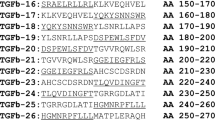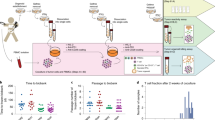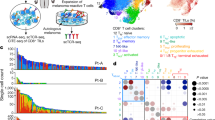Abstract
Peripheral blood mononuclear cells (PBMCs) were obtained from patients receiving radioactive murine monoclonal antibody (MAb) therapy for malignant epithelial tumours, as well as normal controls, and were tested for the ability of T cells to proliferate in vitro in the presence of the MAb administered for therapy (HMFG1), and another isotypically matched antibody of irrelevant specificity (11.4.1). We studied 13 patients who had one (ten patients) or two (three patients) courses of MAB treatment, 11 age matched patients with the same histologic types of tumours, that had not received MAbs, and four normal controls. There was a consistent dose dependent in vitro T cell proliferation in 11 of the 13 patients after MAb therapy. This was not observed in the pre-therapy group of patients or normal controls, where the T cell proliferative responses remained baseline. The mean stimulation index (S.I.) in the post-therapy group was significantly higher than that of the pre-therapy patients and that of normal controls. When the in vitro T cell proliferative responses of these patients were measured in the presence of HMGF1 MAb (IgG1) and an isotypically identical, but idiotypically unrelated 11.4.1 MAb (IgG1), there was no statistically significant difference in the mean S.I. For HMFG1 vs 11.4.1 for the whole group of treated patients. When patients were separated into those who received one and those who received two MAb treatments, a significant increase in the mean S.I. was observed in the presence of HMFG1, in the group of patients receiving two treatment courses, suggesting the generation of T cells with specificity for the idiotypic component of the administered murine immunoglobulin. In order to further characterise these in vitro cellular responses we incubated PBMCs with and without an optimal concentration of the MAb (100-300 micrograms ml-1), as defined by the proliferation assay, and compared the differences in cell subpopulations. A significant increase in the percentage of cells expressing interleukin-2 receptors (IL-2R) was observed after MAb stimulation. The percentage of CD4+ lymphocytes and the CD4/CD8 ratio increased in all the cases studied, after MAb stimulation, where the percentages of B cells and NK cells remained relatively constant at less than 2-3% of the total population. We therefore conclude that murine MAbs administered to patients with cancer can lead to the generation of T cells which can recognise these MAbs as antigens when presented appropriately in vitro. The main proliferating population appears to be T helper CD4+ lymphocytes which following stimulation can release interleukin-2 leading to the expression of high levels of IL-2R.
This is a preview of subscription content, access via your institution
Access options
Subscribe to this journal
Receive 24 print issues and online access
$259.00 per year
only $10.79 per issue
Buy this article
- Purchase on Springer Link
- Instant access to full article PDF
Prices may be subject to local taxes which are calculated during checkout
Similar content being viewed by others
Author information
Authors and Affiliations
Rights and permissions
About this article
Cite this article
Kosmas, C., Epenetos, A. & Courtenay-Luck, N. Patients receiving murine monoclonal antibody therapy for malignancy develop T cells that proliferate in vitro in response to these antibodies as antigens. Br J Cancer 64, 494–500 (1991). https://doi.org/10.1038/bjc.1991.337
Issue Date:
DOI: https://doi.org/10.1038/bjc.1991.337
This article is cited by
-
Immune responses in advanced colorectal cancer following repeated intradermal vaccination with the anti-CEA murine monoclonal antibody, PR1A3: results of a phase I study
International Journal of Colorectal Disease (2005)
-
Induction of an immune network cascade in cancer patients treated with monoclonal antibodies (ab1)
Cancer Immunology Immunotherapy (1993)



